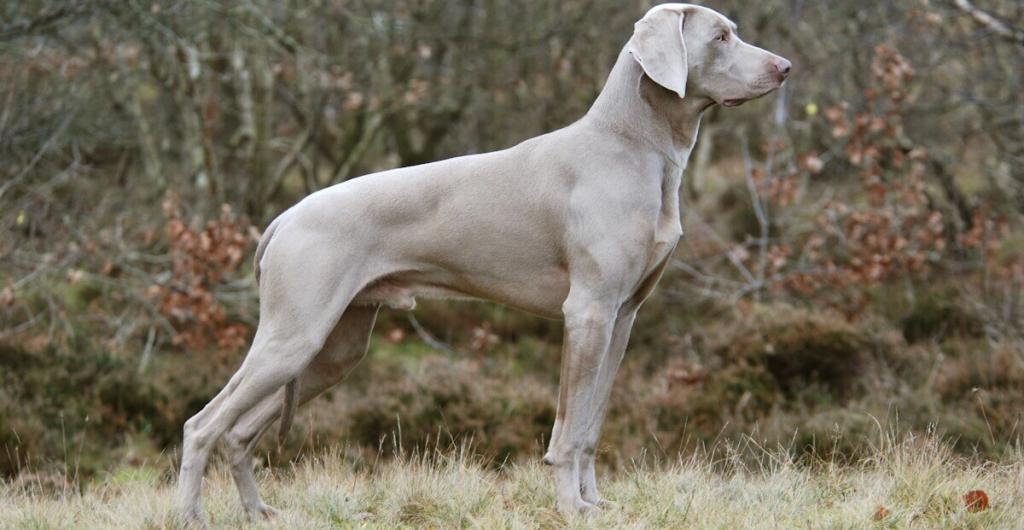In Germany, most hunting dogs are Weimaraners, a testament to their enduring legacy as skilled and versatile hunters.
Considering the sleek, silver-gray coat that has earned these dogs the nickname ‘Gray Ghost,’ it’s important to recognize the unique blend of intelligence, energy, and companionship they bring to a household.
Caring for a Weimaraner requires commitment; they need consistent training, ample exercise, and a strong leader who understands their need for mental stimulation.
Their affectionate nature makes them a beloved family member, but their high energy levels might challenge the unprepared.
As you weigh the pros and cons of bringing one of these charismatic canines into your life, consider whether you’re ready to meet the demands of a dog breed that’s as complex as captivating.
- Noise Level
- Energy
- Sociability
- Trainability
- Care
- Health
Overall
Summary
The Weimaraner is a moderately noisy breed with high energy levels, sociable tendencies, and excellent trainability. They require moderate care and tend to enjoy good health overall.
Weimaraner: Traits, Temperament, and Care Guide
The Weimaraner, a breed with roots in German hunting tradition, exhibits a robust and energetic temperament. It requires an owner who can provide disciplined training and substantial physical activity to channel its innate abilities effectively.
As a potential member of the Weimaraner Club, you’ll understand that this Gray Ghost—named for its distinctive coat color—thrives on daily exercise to mitigate its high activity level and potential separation anxiety.
It’s crucial to harness the Weimaraner’s strong prey drive through positive reinforcement techniques, ensuring a well-adjusted hunting dog that’s both a loyal companion and an agile athlete.
Exploring the Characteristics of the Weimaraner
Diving into the Weimaraner’s characteristics, you’ll find a breed that epitomizes the quintessential high-energy hunting dog, requiring a dedicated owner to match its vigorous exercise and mental stimulation needs. Originating from Germany, these striking dogs are known for their versatile hunting skills and still excel in this role today. They’re not just any pet; they’re velcro dogs, craving constant companionship and a place within their human pack.
| Characteristic | Detail |
|---|---|
| Origin | German breed, hunting heritage |
| Energy | High, requires daily exercise |
| Socialization | Needs early, consistent training |
| Appearance | Sleek gray coat, well-built frame |
| Temperament | Intelligent, affectionate, strong-willed |
As you delve deeper into the world of Weimaraners, you’ll discern their need for a nurturing environment, complemented by a robust exercise regimen, to harness their boundless energy and sharp intellect.
Weimaraner: A Comprehensive Profile and Guide
You’ll find that Weimaraners, with their origins as German hunting dogs, present a dynamic blend of intelligence and vigor, necessitating an owner who can provide ample stimulation and firm training.
As you consider adopting, it’s paramount to prioritize rescue organizations or scrutinize breeders for ethical practices to ensure the well-being of your future companion.
Acknowledge the breed’s susceptibility to specific health issues; an informed approach to their diet and healthcare is crucial to mitigate risks associated with their genetic predispositions.
Everything You Need to Know
Understanding the Weimaraner requires an appreciation of its history as German hunting dogs and a commitment to meeting its high energy and exercise needs. This distinctive gray, high-energy dog has been closely associated with the German Weimaraner Club since its formation, ensuring breed standards and promoting responsible ownership.
- German Weimaraner Club: Established to preserve the breed’s qualities and provide education on proper care.
- Distinctive Gray Coat: Weimaraners have a short coat that’s relatively easy to maintain with occasional brushing.
- High Exercise Needs: They need a lot of exercise, making them unsuitable for sedentary lifestyles.
- Health Maintenance: Awareness of potential health problems is crucial; regular vet check-ups are recommended.
As an independent breed, Weimaraners demand owners who understand their need for companionship and mental stimulation.

Discovering the Temperament
Exploring the temperament of Weimaraners reveals a breed whose affectionate and lively nature necessitates consistent exercise and owner interaction to prevent behavioral issues. Aligning with the breed standard, your Weimaraner is an energetic dog that thrives on vigorous exercise. They need a lot of exercise to keep their svelte frame and maintain a happy and healthy state of mind.
Creating a nurturing environment with plenty of mental stimulation is critical to mitigate the risk of destructive boredom-related behavior. Without this, the iconic Gray Ghost may suffer from separation anxiety, manifesting in excessive barking and restlessness.
To ensure your Weimaraner remains a well-adjusted companion, prioritize daily engagement that challenges their physical and cognitive capabilities.
Weimaraner: Is It a Good Fit for Families?
As you consider a Weimaraner for your family, evaluating their compatibility with children and home life is essential. Their high energy levels and intelligence require dedicated training and socialization to ensure they integrate well with family dynamics.
Analyzing the breed’s need for consistent physical activity and mental stimulation will help determine whether it aligns with your family’s lifestyle and commitments.
Assessing Weimaraner’s Compatibility with Families and Kids
Weimaraners, with their affectionate nature, can integrate well into family settings, provided they receive the necessary early socialization and consistent training to foster compatibility with children. Their adaptability and temperament are key factors in forming strong bonds with all family members. Yet, their protective instincts must be channeled through positive training methods.
Consider these scientific insights for a Weimaraner’s fit with your family:
- Socialization: Early exposure to different people and situations helps prevent overprotectiveness.
- Exercise Requirements: Daily vigorous activity is crucial for their well-being and to curb potential behavioral issues.
- Training Consistency: Clear, positive leadership helps maintain their respect and prevent stubbornness.
- Breed Clubs Advice: Consultation with breed clubs can provide tailored strategies for integrating Weimaraners into family life.
Weimaraner Adjustability Quirks
Understanding the adjustability quirks of the Weimaraner is imperative for potential owners, as their high energy levels and instinctual drives demand consistent training and ample exercise. These dogs need a lot of physical and mental stimulation; thus, a secure, fenced yard is highly recommended. Weimaraners aren’t well-suited for confined living spaces or inactive lifestyles.
Their coat is relatively easy to groom, requiring regular brushing to remove loose hair and maintain its sleek appearance.
Left alone, a Weimaraner may develop separation anxiety, leading to undesirable behaviors. Early socialization is vital in curbing their inherent wariness and fostering adaptability. Despite their intelligence, Weimaraners can display stubbornness, necessitating affirmative leadership.
In their care regimen, owners should be mindful of breed-specific health concerns, such as von Willebrand Disease.
Weimaraner Obedience Tips
You’ll find that establishing a consistent training regimen enhances your Weimaraner’s obedience.
Research indicates that when applied with timing and frequency, positive reinforcement significantly improves learning outcomes in dogs.
Analyze your dog’s responses to different stimuli to tailor your approach, ensuring maximum effectiveness of the training strategies.
Effective Training Strategies
To effectively train a Weimaraner, it’s essential to employ a strategy that hinges on positive reinforcement and consistent leadership to harness their intelligence and mitigate potential stubbornness. Please recognize that these versatile dogs were bred to hunt, which means they need lots of exercise to channel their energy appropriately. Early socialization, advocated by responsible breeders, helps instill good habits from a young age.
| Training Focus | Strategy |
|---|---|
| Physical & Mental Exertion | Combine daily exercise with obedience drills to satisfy their need for enough exercise and mental stimulation. |
| Hunting Instincts | Channel retrieving game instincts through fetch and scent-based games, simulating the pursuit of large game. |
| Preventing Destructive Behavior | Establish a routine to prevent boredom, incorporating challenges that tap into their capacity for complex tasks. |

Exercise and Grooming Needs
Weimaraners demand rigorous daily exercise to channel their abundant energy, which stems from their lineage as skilled hunting dogs. As large breeds, they’re geared for extensive physical activities, aligning well with dog sports and search and rescue roles.
Their exercise and grooming needs are considerable; they need lots of activity to maintain mental and physical health. While Weimaraners have a short, easy-to-care-for coat, it does shed some loose hair, requiring regular brushing with a rubbery tool to minimize accumulation.
Consistent grooming is essential to keeping your Weimaraner in top condition. Despite being large dogs, their grooming routine is quite straightforward—occasional baths, ear cleaning, nail trimming, and teeth brushing suffice. Your Weimaraner’s overall well-being hinges on fulfilling these dog breed needs.
Health Considerations
As you consider the health of your Weimaraner, it’s crucial to recognize their susceptibility to specific conditions.
You’ll need to be vigilant for signs of joint dysplasia, as it can significantly impair mobility and quality of life.
Additionally, understanding the risks of gastric dilatation-volvulus is imperative for prompt intervention, which can be life-saving.
Common Health Issues and Lifespan
Although generally robust, Weimaraners often face health challenges such as ear and skin infections, joint dysplasia, and life-threatening conditions like bloat, which necessitate vigilant care to ensure their lifespan of up to 14 years.
Originally bred with a versatile hunting style, this breed’s athleticism doesn’t shield it from common health issues. Gastric torsion, or bloat, is particularly concerning; it requires immediate veterinary intervention.
Weight gain can exacerbate joint problems like hip and elbow dysplasia, making diet regulation crucial. The long-haired variety shares these risks.
Regular veterinary check-ups are imperative for early detection and management of conditions such as von Willebrand disease and eye disorders.
As a Weimaraner guardian, you’re part of a community dedicated to preserving the health and vigor of these noble dogs.
Is Weimaraner the Right Dog for You?
Considering the Weimaraner’s high energy levels and need for extensive exercise, you should evaluate whether your lifestyle can accommodate this breed’s requirements before committing. The Weimaraner, often known as the gray ghost due to its distinctive coat, presents a set of breed characteristics that demand a thorough understanding of care tips. This includes consistent training to shape their temperament and ensure they’re well-adjusted companions.
Sedentary or first-time dog owners might find the Weimaraner’s exercise needs challenging, as they thrive on vigorous daily activity. Additionally, their friendly nature means they seek constant companionship, and isolation can lead to anxiety. Be aware of health risks, such as the risk of gastric torsion, which necessitates preventive care. Assess these factors meticulously to ensure a harmonious match with the energetic Weimaraner.
Alternatives for Weimaraner: Elegant and Skilled Large Sporting Breeds
Explore these breeds if you’re drawn to the Weimaraner’s elegance and skills in sports, ideal for those who value graceful and capable large sporting dogs.
| Similar Dogs | Short Description |
|---|---|
| Vizsla | Hungarian breed, known for hunting skills and affectionate nature. |
| German Shorthaired Pointer | Versatile hunter, friendly and intelligent. |
| English Setter | Known for its beauty and mild manner, great in field sports. |
| Gordon Setter | Distinguished for its beauty and hunting ability, loyal and affectionate. |
| Irish Setter | Renowned for its rich red coat, energetic and outgoing nature. |
Conclusion
In conclusion, as you weigh the merits of a Weimaraner, consider it akin to a high-performance vehicle: requiring regular tuning and ample space to roam.
This breed’s robust health, keen intelligence, and athletic prowess demand an owner versed in consistent training and an active lifestyle.
Your investment in its physical and mental care will yield a loyal companion, but remember, the Weimaraner’s suitability hinges on your ability to meet its vigorous needs.
